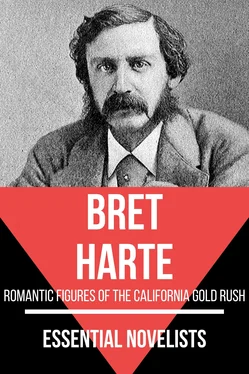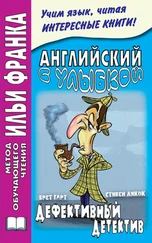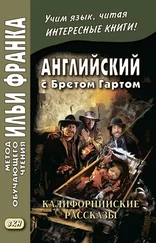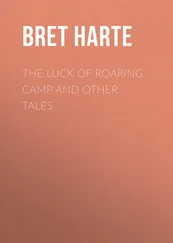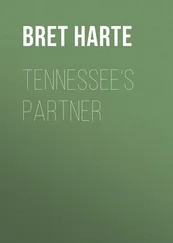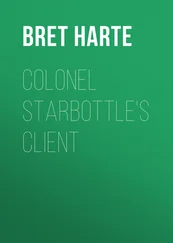1 ...6 7 8 10 11 12 ...34 By one common superstitious instinct the whole party had crowded together—those who, a few moments before, had been loudest in their scepticism, held their breath with awe, and trembled with excitement—as the shambling figure that had watched them enter the cañon rose from its lair, and taking upon itself a human semblance, with uncouth gestures and a strange hoarse cry made towards them. It was Dumphy!
The leader was the first to recover himself. He advanced from the rest and met Dumphy half-way.
"Who are you?"
"A man."
"What's the matter?"
"Starving."
"Where are the others?"
Dumphy cast a suspicious glance at him and said—
"Who?"
"The others. You are not alone?"
"Yes, I am!"
"How did you get here?"
"What's that to you? I'm here and starving. Gimme suthin' to eat and drink."
He sank exhaustedly on all fours again.
There was a murmur of sympathy from the men.
"Give him suthin'. Don't you see he can't stand—much less talk? Where's the doctor?"
And then the younger of the leaders thus adjured—"Leave him to me—he wants my help just now more than yours."
He poured some brandy down his throat. Dumphy gasped, and then staggered to his feet.
"What did you say your name was?" asked the young surgeon kindly.
"Jackson," said Dumphy, with a defiantly blank look.
"Where from?"
"Missouri."
"How did you get here?"
"Strayed from my party."
"And they are——"
"Gone on. Gimme suthin' to eat!"
"Take him back to camp and hand him over to Sanchez. He'll know what to do," said the surgeon to one of the men. "Well, Blunt," he continued, addressing the leader, "you're saved—but your nine men in buckram have dwindled down to one, and not a very creditable specimen at that," he said, as his eyes followed the retreating Dumphy.
"I wish it were all, doctor," said Blunt simply; "I would be willing to go back now, but something tells me we have only begun. This one makes everything else possible. What have you there?"
One of the men was approaching, holding a slip of paper with ragged edges, as if torn from some position where it had been nailed.
"A notiss—from a tree. Me no sabe," said the ex-vaquero.
"Nor I," said Blunt, looking at it; "it seems to be in German. Call Glohr."
A tall Swiss came forward. Blunt handed him the paper. The man examined it.
"It is a direction to find property—important and valuable property—buried."
"Where?"
"Under a cairn of stones."
The surgeon and Blunt exchanged glances.
"Lead us there!" said Blunt.
It was a muffled monotonous tramp of about an hour. At the end of that time they reached a spur of the mountain around which the cañon turned abruptly. Blunt uttered a cry. Before them was a ruin—a rude heap of stones originally symmetrical and elevated, but now thrown down and dismantled. The snow and earth were torn up around and beneath it. On the snow lay some scattered papers, a portfolio of drawings of birds and flowers: a glass case of insects broken and demolished, and the scattered feathers of a few stuffed birds. At a little distance lay what seemed to be a heap of ragged clothing. At the sight of it the nearest horseman uttered a shout and leaped to the ground. It was Mrs. Brackett, dead.
CHAPTER VII. IN WHICH THE FOOTPRINTS BEGIN TO FADE.
She had been dead about a week. The features and clothing were scarcely recognizable; the limbs were drawn up convulsively. The young surgeon bent over her attentively.
"Starved to death?" said Blunt interrogatively.
The surgeon did not reply, but rose and examined the scattered specimens. One of them he picked up and placed first to his nose and then to his lips. After a pause he replied quietly—
"No. Poisoned."
The men fell back from the body.
"Accidentally, I think," continued the surgeon coolly; "the poor creature has been driven by starvation to attack the specimens. They have been covered with a strong solution of arsenic to preserve them from the ravages of insects, and this starving woman has been the first to fall a victim to the collector's caution."
There was a general movement of horror and indignation among the men. "Shoost to keep dem birds," said the irate Swiss. "Killing women to save his cussed game," said another. The surgeon smiled. It was an inauspicious moment for Dr. Devarges to have introduced himself in person.
"If this enthusiastic naturalist is still living, I hope he'll keep away from the men for some hours," said the surgeon to Blunt, privately.
"Who is he?" asked the other.
"A foreigner—a savant of some note, I should say, in his own country. I think I have heard the name before—'Devarges,'" replied the surgeon, looking over some papers that he had picked up. "He speaks of some surprising discoveries he has made, and evidently valued his collection very highly."
"Are they worth re-collecting and preserving?" asked Blunt.
"Not now!" said the surgeon. "Every moment is precious. Humanity first, science afterward," he added lightly, and they rode on.
And so the papers and collections preserved with such care, the evidence of many months of patient study, privation, and hardship, the records of triumph and discovery were left lying upon the snow. The wind came down the flanks of the mountain and tossed them hither and thither as if in scorn, and the sun, already fervid, heating the metallic surfaces of the box and portfolio, sank them deeper in the snow, as if to bury them from the sight for ever.
By skirting the edge of the valley where the snow had fallen away from the mountain-side, they reached in a few hours the blazed tree at the entrance of the fateful cañon. The placard was still there, but the wooden hand that once pointed in the direction of the buried huts had, through some mischance of wind or weather, dropped slightly, and was ominously pointing to the snow below. This was still so deep in drifts that the party were obliged to leave their horses and enter the cañon a-foot. Almost unconsciously, this was done in perfect silence, walking in single file, occasionally climbing up the sides of the cañon where the rocks offered a better foothold than the damp snow, until they reached a wooden chimney and part of a roof that now reared itself above the snow. Here they paused and looked at each other. The leader approached the chimney, and leaning over it called within.
There was no response. Presently, however, the cañon took up the shout and repeated it, and then there was a silence broken only by the falling of an icicle from a rock, or a snow slide from the hill above. Then all was quiet again, until Blunt, after a moment's hesitation, walked around to the opening and descended into the hut. He had scarcely disappeared, as it seemed, before he returned, looking very white and grave, and beckoned to the surgeon. He instantly followed. After a little, the rest of the party, one after another, went down. They stayed some time, and then came slowly to the surface bearing three dead bodies. They returned again quickly, and then brought up the dissevered members of a fourth. This done they looked at each other in silence.
"There should be another cabin here," said Blunt after a pause.
"Here it is!" said one of the men, pointing to the chimney of the second hut.
There was no preliminary "hallo!" or hesitation now. The worst was known. They all passed rapidly to the opening, and disappeared within. When they returned to the surface they huddled together—a whispering but excited group. They were so much preoccupied that they did not see that their party was suddenly increased by the presence of a stranger.
CHAPTER VIII. THE FOOTPRINTS GROW FAINTER.
It was Philip Ashley! Philip Ashley—faded, travel-worn, hollow-eyed, but nervously energetic and eager. Philip, who four days before had left Grace the guest of a hospitable trapper's half-breed family in the California Valley. Philip—gloomy, discontented, hateful of the quest he had undertaken, but still fulfilling his promise to Grace and the savage dictates of his own conscience. It was Philip Ashley, who now standing beside the hut, turned half-cynically, half-indifferently toward the party.
Читать дальше
